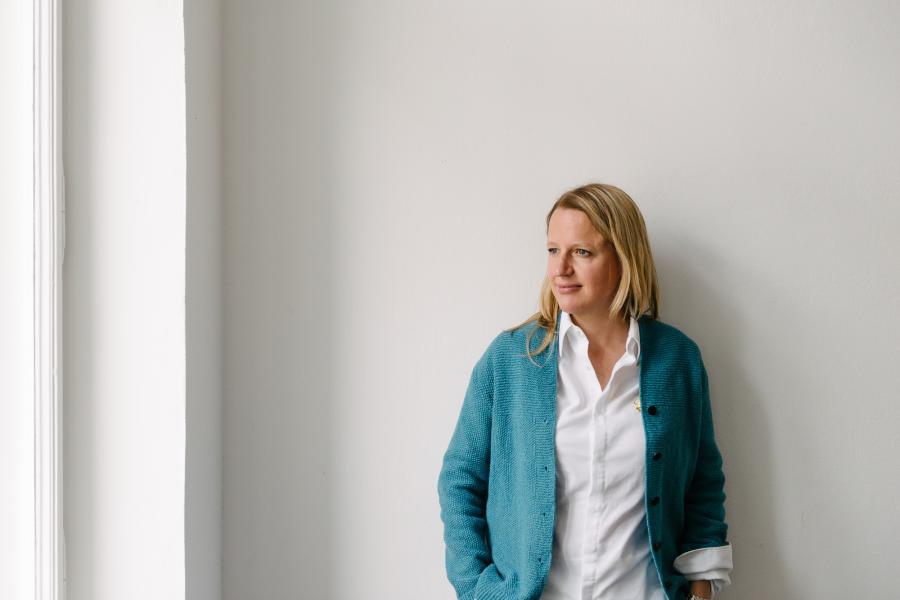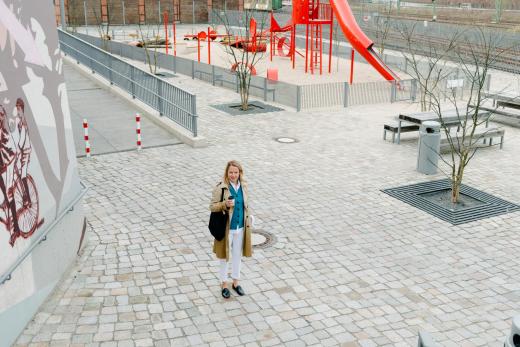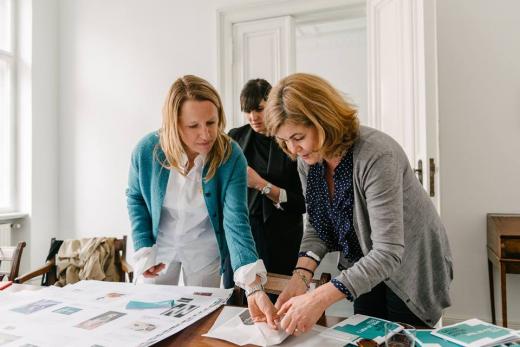Artistic license: Maike Cruse on the developing art scene around Gleisdreieck Park
Artistic license: Maike Cruse on the developing art scene around Gleisdreieck Park

Maike Cruse doesn’t have time for morning rituals, leisurely breakfasts or long showers. Once she has taken care of her two children, the director of Gallery Weekend Berlin and abc (art berlin contemporary) art fair jumps straight onto her bicycle and starts her journey into work.
This article has been produced by Freunde von Freunden
Follow the link for the full story
“I’m usually already on the phone when I’m cycling,” she admits with a laugh during our chat. It’s a remarkable testament to Maike’s passion for her work— it takes just ten short minutes through the park at Gleisdreieck to get to her office on Potsdamer Strasse.
Maike works here with two colleagues, and together the trio are a well-oiled machine. Mutual trust and years of experience mean the team can often approach things without all the red tape. If you can make the rules, you can also bend them creatively, conjuring up new ideas at the last minute. The freedom to work unconventionally within a successful format like the Gallery Weekend is a luxury, which the former communications manager of Art Basel appreciates. For Maike, the two events she heads are all about the content: “What I find interesting about art are works that open people’s minds.”
Spending the day with Maike, we delve into her passion for art, career background, and the Gallery Weekend Guide, which makes its first appearance in 2016 with the support of Audemars Piguet.
We start our tour in the south part Gleisdreieck park, passing Station Berlin on our way to Potsdamer Strasse—the venue of the abc art fair. At every turn along the way, Maike has something to add about new little details and is visibly excited about the diverse possibilities for using the park.

What makes Berlin so engaging for you?
Maike Cruse: So much is moving forward in Berlin. For example, I find what’s going on here in the park at Gleisdreieck and around Potsdamer Strasse particularly interesting. Especially from the perspective of the art world. In recent years a completely new art centre has developed here with established galleries like Esther Schipper, Guido Baudach and Blain Southern and young galleries like Tanya Leighton, Supportico Lopez or Micky Schubert. There’s a lot of potential for tension and development, enhanced by all the creatives who are moving to the city from all over the world. It’s also true of selling art. Berlin used to be a weak art market, but now lots of collectors have moved here and young people are also starting to collect art.
There are lots of new galleries, but also lots of new independent project spaces. How successful do you think they will be?
The sheer number of project spaces is unbelievable. I think there are about 130 of them by now. That’s great of course, because they are places where curators, artists and critics can experiment. It really suits Berlin and shows the city in a great light. It’s developing so quickly that it’s difficult to keep an overview of it now. But I think that this is exactly what has to happen to stop these project spaces from being institutionalized, meaning they keep their energy.
Can you tell us about your path in Berlin and how you became director of Gallery Weekend and the abc art fair?
My favorite spot in Berlin was always Die Kunst-Werke [KW]. I’ve actually seen every exhibition there since the start of the ’90s and always wanted to work there. So after studying, I moved to Berlin, went into the KW and asked if I could work there. They said, ‘You can start tomorrow with an internship’. That was in 2001. It was still fairly chaotic back then. Then, one thing led to another and the whole institution gradually became more professional. I was the press officer for KW and the Berlin Biennale. At the same time, I had my own exhibition project in Kreuzberg, “The Forgotten Bar Project”, where we did a different exhibition every night for a whole summer. Then more international projects followed with a group of artist friends.

You switched to Art Basel later on, right?
Yes, I was asked if I wanted to take the job of communications manager by Marc Spiegler [director of Art Basel from 2007]. After three years there I came back to Berlin and was approached by the gallerists—who had founded and were running abc and Gallery Weekend up until then—whether I would be interested in running the abc art fair as director. Later on I took on Gallery Weekend as well.
In light of your career, we’re interested to know: What does success mean for you?
I am only successful when everyone else is. If an exhibition looks good at the abc, when the architecture works and particularly high-quality exhibitions take place at Gallery Weekend. And, finally when collectors, curators and museum people from all over the world come to Berlin and art is bought. From my observation point, I inevitably always keep an eye on what is not going well. I’m always working towards making things even better.
How did you choose the galleries that we are going to visit on our tour?
The galleries that we are going to visit are both located near my office. Alfons Klosterfelde from Klosterfelde Edition took over the gallery a few years ago from his mother. He runs it very confidently and has a lot of plans for it. Société is a younger gallery that started as a project space. It has a very independent, specialized program with its own base of artists like Bunny Rodgers, Timur Si-Qin and Trisha Baga, which is building up over time.
* * * * *
Read full story at Freunde von Freunden
This article has been produced by Freunde von Freunden
Photography: Daniel Müller
Interview: Chrischa Oswald